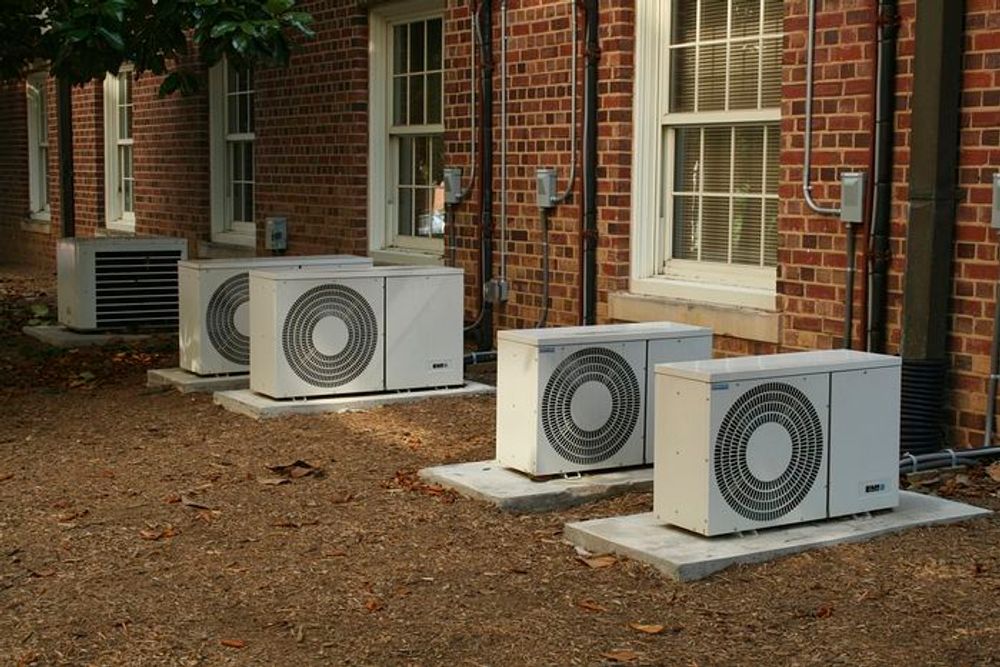Choosing the right heating and air conditioning system for your home or business is a decision that impacts not only your comfort but also your wallet and the environment. With so many options available, it can feel overwhelming to find the perfect fit for your specific needs. From understanding the basics of HVAC systems to evaluating energy efficiency and considering the benefits of additional features, this article aims to guide you through the process.
Whether you’re building a new space or upgrading your current system, we’ll explore key considerations, including system types, professional installation, and maintenance costs, to ensure you make an informed choice. Join us as we delve into the world of heating and air conditioning, offering insights and tips to help you achieve optimal indoor comfort and efficiency.
What is a Heating and Air Conditioning System?
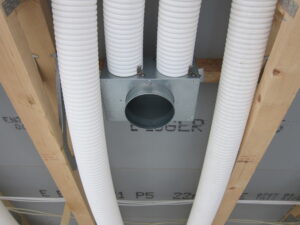
A heating and air conditioning system, commonly referred to as HVAC (Heating, Ventilation, and Air Conditioning), is an integrated solution designed to regulate indoor temperature and air quality. At its core, the system’s primary goal is to offer comfort to occupants by adjusting the climate within a space to meet the desired conditions, irrespective of external weather variations. This is achieved through a complex network of components that work in harmony, including an air conditioner to cool the air during warm periods, a furnace to heat the air when it’s cold, and ventilation mechanisms to ensure the air within a space is continuously refreshed and free of pollutants.
Understanding the search intent and the networks of meaning around HVAC systems, it’s clear that individuals looking into this topic are likely seeking comfort, efficiency, and possibly solutions to improve their indoor air quality. The system operates on principles of thermodynamics, fluid mechanics, and heat transfer, which, although complex, are seamlessly integrated to provide an effortless user experience. Users can adjust settings, often with simple interfaces or even remotely, to maintain their ideal living or working environment.
Moreover, the importance of such systems extends beyond mere comfort. In regions experiencing extreme temperatures, a well-functioning HVAC system can be critical for safety, preventing heat stroke or hypothermia. Additionally, with growing concerns about air quality and its impact on health, the ventilation aspect of HVAC systems plays a crucial role in filtering out pollutants and circulating fresh air, contributing to a healthier living environment.
In summary, a heating and air conditioning system is a sophisticated network designed to balance indoor climate and air quality, reflecting a deep understanding of environmental control technologies and the human need for comfort and safety. Its development and usage underscore the importance of creating adaptable living and working spaces that can withstand the challenges posed by changing external conditions.
Why Choosing the Right System is Crucial

Choosing the right heating and air conditioning system is crucial for several key reasons. First, energy efficiency directly impacts your utility bills, making it vital to select a system that does not consume excessive power. A more efficient system means lower monthly expenses, offering significant savings over time.
Second, your comfort is greatly affected by the system you choose. The right HVAC system will ensure your living or working environment is always at a pleasant temperature, enhancing your quality of life. Lastly, cost-effectiveness plays a significant role.
Investing in the right system can save you money in the long term by reducing the need for frequent repairs or replacements and lowering operational costs. Together, these aspects highlight the importance of selecting an HVAC system that aligns with your specific needs, considering the size of your space, local climate, and available energy sources. Making an informed decision ensures not only improved comfort and air quality but also financial savings and environmental sustainability.
Energy Efficiency Impacts Utility Bills
Energy efficiency is crucial for keeping utility bills low. A heating and air conditioning system with high efficiency uses less energy to heat or cool your space, leading to lower monthly costs. This efficiency is especially important during extreme weather when HVAC systems work the hardest.
Comfort Affects Living Conditions
Comfort in your home or workplace is greatly influenced by your HVAC system. A system that can consistently maintain your preferred temperature and manage humidity contributes to a better living and working environment. This can improve sleep, reduce health issues, and increase overall satisfaction and productivity.
Cost-Effectiveness Saves Money Long-Term
Selecting a cost-effective heating and air conditioning system is an investment in your future. Systems designed for efficiency and durability require fewer repairs and have lower operating costs, which translates to significant long-term savings. This foresight ensures that the initial investment in a quality system pays dividends in comfort, savings, and reliability over its lifetime.
Key Considerations for System Selection
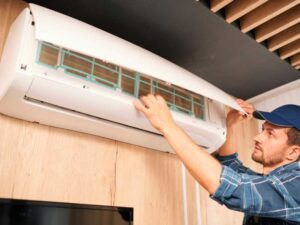
When choosing a heating and air conditioning system, it’s essential to consider several key factors to ensure you select a system that best fits your needs and operates efficiently.
- Assessing the size of your space is crucial. A system that’s too large or too small for your area can lead to inefficiency and increased energy costs. The right size ensures your system operates at peak performance, maintaining comfort without wasting energy.
- Understanding your local climate plays a significant role in selecting the appropriate system. Different systems perform better in certain climates, so it’s important to choose one that’s well-suited to your area’s weather patterns. This ensures your system can effectively manage the temperature and humidity levels in your home or office.
- Available energy sources in your region can influence your choice. The types of energy available for heating and cooling systems vary, including electricity, natural gas, and solar power. Selecting a system that aligns with the most cost-effective and sustainable energy sources available to you can significantly impact both the installation and operational costs.
Considering these factors carefully will guide you to a heating and air conditioning system that not only meets your specific needs but also contributes to long-term energy savings and enhanced comfort.
Assessing the Size of Your Space
Assessing the size of your space is crucial for HVAC efficiency. A system that’s too large or too small can lead to energy waste and discomfort. Measure your space accurately to ensure your system can efficiently heat and cool your area without overworking.
Understanding Your Local Climate
Understanding your local climate is essential for choosing an HVAC system tailored to your needs. Whether you’re battling intense heat, freezing temperatures, or a mix of both, selecting a system designed for your climate’s challenges ensures optimal performance and comfort throughout the year.
Available Energy Sources
Available energy sources in your region significantly impact your HVAC system choice. From electricity and natural gas to solar energy, each source has its benefits and limitations. Opting for the most cost-effective and sustainable energy source can lead to long-term savings and a smaller environmental footprint.
Different System Types
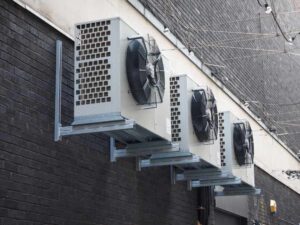
When it comes to heating and air conditioning, there are several system types to consider, each with its own set of benefits and best use cases.
- Central Heating and Cooling: This system is ideal for heating and cooling large spaces efficiently through a network of ducts. It’s a popular choice for its ability to maintain a consistent temperature throughout a home or building.
- Ductless Mini-Splits: Perfect for homes without ductwork, ductless mini-splits allow for targeted heating and cooling in specific areas or rooms. They offer flexibility and are often more energy-efficient than traditional systems.
- Heat Pumps: Known for their efficiency, heat pumps are best suited for mild climates. They work by transferring heat to either warm or cool a space, rather than generating heat, making them an environmentally friendly option.
- Window Units: These are a straightforward solution for single-room cooling needs. Window units are easy to install and can be a cost-effective option for small spaces or as a supplement to other systems.
Each system type has its unique advantages and limitations, making it crucial to assess your specific needs, the size of your space, and your local climate to determine the most suitable HVAC solution.
Central Heating and Cooling
Central heating and cooling systems offer a comprehensive solution for regulating the temperature throughout an entire building or home via an extensive network of ducts.
Pros and Cons
Pros: These systems provide consistent temperature control, can improve air quality through integrated filtration, and are seamlessly integrated into a building’s structure. Cons: Installation can be costly if ductwork is not already in place, and energy loss through ducts can occur without proper insulation and maintenance.
Ductless Mini-Splits
Ductless mini-splits consist of an outdoor compressor and one or more indoor air handling units, offering targeted heating and cooling without the need for traditional ductwork.
Ideal for Homes Without Ducts
Perfect for buildings without existing ductwork, room additions, or areas requiring individual temperature settings. They offer an efficient, minimally invasive installation process compared to ducted systems.
Heat Pumps
Heat pumps are versatile, energy-efficient systems that transfer heat to warm or cool a space, drawing heat from outdoor air or the ground.
Efficient in Mild Climates
Best suited for regions with milder winters, as their efficiency decreases in extremely cold temperatures. They provide an eco-friendly heating and cooling solution by minimizing the use of fossil fuels.
Window Units
Compact and easy to install, window units are designed to fit within a window frame, providing a simple cooling solution for individual rooms.
Suitable for Small, Single Rooms
Ideal for cooling small spaces or serving as a supplemental cooling source. They are cost-effective, easily installed or removed, and offer flexibility for seasonal use.
Evaluating Energy Efficiency
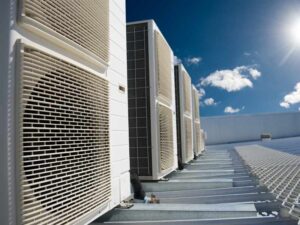
Evaluating energy efficiency is a critical aspect of choosing the right heating and air conditioning system. Energy efficiency not only has a significant impact on the environment by reducing greenhouse gas emissions but also directly influences your utility expenses. Systems that boast high SEER (Seasonal Energy Efficiency Ratio) ratings for cooling and HSPF (Heating Seasonal Performance Factor) ratings for heating are deemed to be more efficient.
These ratings are key indicators of how much energy a system consumes to deliver a specified level of heating or cooling comfort. A system with a higher SEER or HSPF rating is more energy-efficient, meaning it requires less energy to operate, which translates into lower monthly energy bills. Opting for an energy-efficient HVAC system is a smart choice that promotes both financial savings and environmental stewardship.
SEER Ratings for Cooling
SEER (Seasonal Energy Efficiency Ratio) ratings are a key metric for assessing the efficiency of air conditioning systems. The higher the SEER rating, the more efficiently the system operates, using less energy to cool your environment.
Higher SEER Means More Efficiency
A system with a higher SEER rating is not only more environmentally friendly but also more economical in the long run. It signifies a unit’s superior ability to cool your space with minimal energy expenditure, leading to significant savings on utility bills.
HSPF Ratings for Heating
HSPF (Heating Seasonal Performance Factor) ratings gauge the efficiency of heating systems, such as heat pumps. Similar to SEER, a higher HSPF rating indicates a system’s efficiency in converting electricity into heating energy.
Higher HSPF Indicates Better Efficiency
Heating systems boasting a higher HSPF rating are more effective at providing warmth while consuming less energy. This efficiency not only contributes to lower operational costs but also reduces the carbon footprint associated with heating your home or office.
The Role of Professional Installation
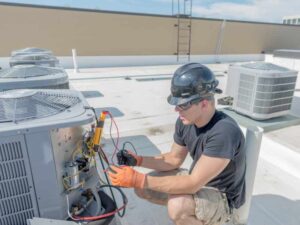
Professional installation is critical in maximizing the efficiency and longevity of your heating and air conditioning system. Expert installers ensure that your system is not only the correct size for your space but also installed in accordance with the manufacturer’s specifications and local building regulations. This meticulous attention to detail helps prevent future issues such as inefficient operation, frequent breakdowns, and even premature system failure.
Additionally, professionals can offer essential maintenance advice and identify potential problems early on, averting expensive repairs. Ultimately, opting for professional installation services guarantees that your HVAC system operates at its peak, providing a comfortable indoor environment and efficient energy usage.
Ensures Optimal System Performance
Professional installation is crucial for ensuring that your HVAC system operates at its highest efficiency. It ensures the system is properly sized and accurately configured to your space’s specific requirements, leading to optimal performance. This encompasses efficient heating and cooling, consistent comfort levels across rooms, and minimized energy expenditure.
Can Prevent Future Issues
Adhering to professional standards during installation can significantly reduce the likelihood of common problems associated with improper setup, such as uneven temperature distribution, excessive wear and tear, and increased need for repairs. Moreover, professional installers can identify and address potential issues before they escalate, thereby preventing future complications and ensuring the longevity of your system.
Maintenance and Operating Cost Considerations
When choosing a heating and air conditioning system, it’s vital to factor in maintenance and operating costs to fully grasp the long-term financial implications. Regular maintenance is key to keeping the system running at peak efficiency, which directly influences its cost-effectiveness and longevity. Systems with higher SEER and HSPF ratings generally boast lower operating costs due to their enhanced energy efficiency, requiring less energy to maintain comfortable indoor conditions.
Furthermore, accurately estimating energy costs based on these efficiency ratings can aid in budgeting for monthly expenses. Opting for a system that aligns with your initial budget while also considering its efficiency and maintenance requirements ensures a balance between upfront investment and long-term savings. This approach allows for selecting a system that not only meets immediate comfort needs but also remains economically viable throughout its operational lifespan.
Regular Maintenance is Crucial
Regular maintenance is essential to keep your heating and air conditioning system operating at peak performance. It not only helps in avoiding unexpected breakdowns but also extends the overall lifespan of the system.
Keeps the System Running Efficiently
Consistent maintenance ensures that your HVAC system runs as efficiently as possible. This high level of efficiency is key to maintaining comfortable indoor temperatures and reducing energy consumption, leading to lower utility bills.
Estimating Energy Costs
Estimating energy costs associated with your HVAC system is crucial for understanding your monthly financial commitments. It offers a clearer picture of how much you’ll spend on heating and cooling, allowing for more informed financial planning.
Helps Budget for Monthly Expenses
Having a precise estimate of energy costs aids in budgeting for monthly expenses. This foresight enables homeowners and businesses to allocate their financial resources wisely, ensuring that heating and cooling costs are manageable within their overall budget.
Additional Features Worth Considering
When choosing a heating and air conditioning system, considering additional features can significantly enhance comfort, efficiency, and health benefits. Programmable thermostats offer the convenience of setting your system to automatically adjust temperatures according to your daily schedule, leading to energy savings and consistent comfort. Air purification systems are essential for improving indoor air quality, and effectively removing pollutants, allergens, and other harmful particles, thus fostering a healthier living environment.
Zoning systems provide the flexibility to control the temperature in different areas or rooms independently, ensuring personalized comfort throughout your space. Integrating these advanced features into your HVAC system can result in a more customized, efficient, and comfortable indoor climate, making them valuable additions to consider for any system installation or upgrade.
Programmable Thermostats
Programmable thermostats offer the convenience of setting your HVAC system to automatically adjust temperatures based on your daily routine. This smart feature ensures optimal comfort while enhancing energy efficiency.
Air Purification Systems
Air purification systems play a crucial role in improving indoor air quality. By removing pollutants, allergens, and other airborne particles, they create a healthier living or working environment.
Zoning Systems
Zoning systems provide the flexibility to set different temperatures in various areas of your home or office. This allows for personalized comfort levels across different rooms, catering to the unique preferences of each occupant.
Choose Callidus Air for All Your HVAC Services
Choosing Callidus Air for your HVAC needs ensures you’re partnering with a provider dedicated to delivering exceptional service and expertise. Our team of seasoned professionals is committed to offering comprehensive HVAC solutions, including installation, maintenance, repairs, and upgrades. We place a strong emphasis on energy efficiency, comfort, and cost-effectiveness, ensuring our services are perfectly tailored to each customer’s specific requirements.
Our unwavering dedication to quality and customer satisfaction positions Callidus Air as your ideal choice for ensuring your home or business benefits from optimal indoor climate control. Trust in Callidus Air to provide reliable, efficient, and personalized HVAC services that meet and exceed your expectations.
In Summary
In conclusion, the journey to selecting the right heating and air conditioning system is guided by a comprehensive evaluation of energy efficiency, system type, and the importance of professional installation and maintenance. Understanding the specific needs of your space, such as its size, the local climate, and the available energy sources, is crucial for making an informed decision that ensures a balance between comfort, cost-effectiveness, and sustainability. Incorporating additional features like programmable thermostats, air purification systems, and zoning capabilities can significantly enhance system efficiency and personal satisfaction.
Opting for a trusted HVAC service provider like Callidus Air not only guarantees expert advice and quality installation but also ensures ongoing support for maintaining a comfortable and healthy indoor environment throughout the year.

